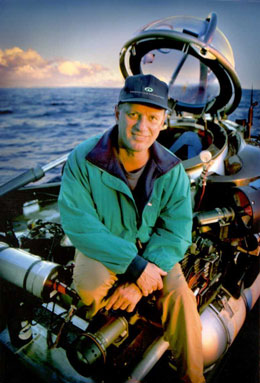Black Sea Treasures
Air Date: Week of July 25, 2003
Host Pippin Ross talk with undersea explorer Dr. Robert Ballard about his upcoming venture to search for lost ancient vessels in the Black Sea.
Transcript
ROSS: It’s Living on Earth. I’m Pippin Ross, and coming up: The other English Potter. But first: Dr. Robert Ballard found the Titanic, PT Boat 109, and the Bismarck, to name a few on his long list of underwater finds. This week, the oceanographer and self-described “undersea explorer” is leading an expedition to the Black Sea to hunt for shipwrecks as old as 1000 B.C. I met with Dr. Ballard in his office at the Mystic Aquarium’s Institute for Exploration recently, and asked him why, when there’s so much ocean to explore, he keeps returning to the waters off of Turkey’s northern coast.
 Dr. Robert Ballard (Photo: Kip R. Evans) Dr. Robert Ballard (Photo: Kip R. Evans) |
BALLARD: Well, it’s because the Black Sea, due to its unique chemistry, has the best-preserved ancient ships in the world. And we want to find them and explore them, because there, we feel, because of their high state of preservation, we can learn more about our ancient history than we could any other way.
ROSS: The Black Sea is where the mythical figure, Jason, traveled in search of the Golden Fleece. And you have actually theorized that, you know, myth and legend are, in a way, perhaps like rumors, probably based in some truth. BALLARD: Yes, I do believe that most of these legends that were carried on through oral histories, that could last that long, must be such a powerful story that it probably is in some way based upon fact. We do know that the Greeks came into the Black Sea. In fact, we just found a Greek ship from the Hellenic Period in the bottom of the Black Sea, well preserved. So we know the Greeks came in there, and the came in there for food, because the upper layers of the Black Sea, although the bottom layers are dead, the upper layers are very rich and full of fish. And much more so than around the Greek states in the Aegean. And so the Greeks went in there for fish, but they also went in there for gold. ROSS: Speaking of fish, in your last Black Sea expedition you found things like mollusk shells dating back to 5000 B.C., now extinct. And I’m wondering, is extinction, to you, part of a natural cycle? Or is it, as many of us seem to see it, the result of something negative, something toxic, something necrotic? BALLARD: We have seen dramatic changes occurring to the Earth through natural forces, some very violent. And that’s just the way it is. We can’t do much about that. But we can do things about ourselves, and so I think the focus is, well, there are things that are being done that are harmful that we can not have happen, and then there are things that we can just explain – happen. ROSS: Well, along those lines then, I’m wondering, as an undersea archaeologist and explorer, have you seen considerable degradation? Or are you seeing that things are maybe okay? BALLARD: Well, I know the Phoenician ships we found were covered in trash, lot’s of garbage bags. Did they do any damage? No, not really. There wasn’t any damage being done to them, but it’s sort of sad to see an ancient ship covered in trash. But I certainly have not seen major degradation of deep water sites. But sometimes what you see isn’t what’s there. I know that, for example, certain pelagic animals – out in the middle of nowhere we’ve seen a sudden drop in the lead content of the bodies when we stopped using leaded gasoline. And so the lead had been being carried by the atmosphere - something you can’t even see - and yet it was reaching creatures at great depths and changing their chemistry, probably in an adverse way. ROSS: How does that all influence the future of all of us who are sitting on this water-filled globe? BALLARD: Well, first place, you quickly realize that the oceans are the driver of our climate. You may live in Kansas and not think the ocean’s very important, but you better get down on your hands and knees and thank it for the rain. You better thank it for it’s moderating capability. The ocean moderates the climate on our planet. Look at its sister planets of Mars, Venus, and Mercury that are alternating between a burning inferno when the sun hits it and a freezing refrigerator when it doesn’t. So the ocean has a huge impact upon the climate of our planet. It’s also where life began, and there’s more living tissue in the oceans of the world than there are on land. And there’s many unexplored regions of the planet. We haven’t even conducted Lewis and Clark expeditions, or Lois and Clark expeditions, in the Southern Hemisphere of our planet. It’s largely unexplored. We have better maps of Mars and Venus than of Earth. And I think Earth – although I love exploration of outer space – I think the exploration of our own planet is as important or more so. [MUSIC: Beastie Boys “Song for Junior” Hello NastyCapitol (1998)] Links
|





